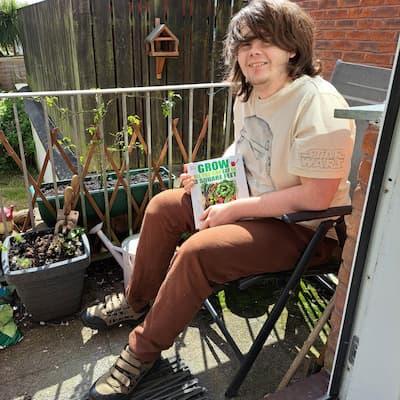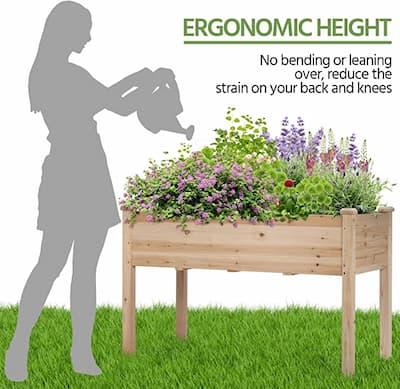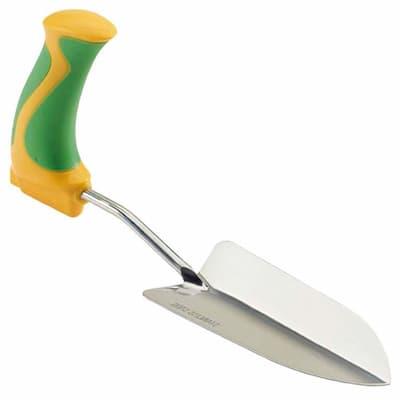Gardening with disabilities
This week is National Gardening Week in the UK and Michael (one of our newest Illumin8 members) was keen to share his passion for gardening as well as let others know about grants that can help get you into the garden.
Read on to find out more about Michael’s top gardening tips, grants for gardening with a disability, and a few suggestions for ways gardening can be adapted for those with disabilities.
Find out more about National Gardening Week.
Gardening can have so many benefits for your physical and mental health… proven! It’s a great way to be active (without the need to hit the gym), it gets you outside enjoying the sunshine, you can get stuck into nature, it can be a great way to connect with people, and gardening can give you a real sense of achievement when you see your blowers bloom or pull your first carrot from the soil.

Michael’s garden
Michael first got into gardening when he used to visit his Gran… he remembers her always planting things, making cuttings and growing things. Michael used to grow flowers from seed and then he would sell them on a little trolly that his Gran had at the end of her drive.
Since then, he has continued spending time in his garden and gardening is now something that Michael and his Mum enjoy together. At the moment he’s growing roses, lavender, and fuchsias in the garden, and has chilli plants, aloe vera, and LOTS of cacti in the kitchen!
We asked Michael and him Mum for their top gardening tips and here’s what they had to say:
TOP TIPs
“When we go to the garden centre, we always look for the sale section – even though they don’t look like much, once you get them home, re-pot them and water them, they come up fine.” Michael’s Mum
“Always save your pots – there’s no point throwing that pot away because you’ll need them for another lot.” Michael
Meet new people
Growing greenery has been proven to be good for your mental and physical health. Growing can improve your mood, reduce stress, encourage you to be more active, help you get to know new people, and help you feel more connected to nature.
Michael is a member of Cornwall Mind’s Gardening Club which runs each week in Bodmin (they also have a similar group running weekly in Falmouth). Groups like this are a great way to learn new skills, get hints and tips from gardening veterans, and meet new friends over a cuppa.
Find out more about Cornwall Mind’s Gardening Club in Bodmin and Falmouth.
No garden?
Don’t let a lack of a garden stop you from gardening! You can grow in pots in any space, whether that’s a patio, a balcony, or a windowsill.
“You just need a pot and a seed really. You can use your hands, you can use a wooden spoon. For watering, you can just use a water bottle.” Michael
You can grow flowers, fruits, or veggies in a pot, just remember to read the labels and these will tell you everything you need to know about the plant. Look out for dwarf varieties or varieties that are specifically designed for pots.
If you’re stuck, or if you want suggestions for good things to grow, don’t be afraid to ask at your local garden centre or gardening club. Gardeners love to help each other out and share their hints and tips!
Grants for gardens
Michael has recently been granted £350 from the Gardening with Disabilities Trust to buy adaptive equipment for him to garden more comfortably.
The Gardening with Disabilities Trust is a volunteer-run charity with the specific aim of helping adults (over 18s) with disabilities get into the garden and get gardening.
“It’s all about accessibility into the garden. So, if you need ramps into the garden, raised beds, they can help. For Michael, if he’s got the raised beds, it’s easier. We found galvanised ones of Amazon which is stupidly cheap.” Michael’s Mum
Typically, their grants can fund:
- Raised beds
- Poly Tunnels
- Greenhouses
- Tools
- Small-scale garden adaptations. e.g. access pathways
- Plants or Shrubs
- Compost
- Accessibility ramps
- Handrails for outside steps
- Adapted tools
Find out more about the Gardening with Disabilities Trust.
Accessible gardening
If you think you “can’t” garden because of a disability, here’s just a few suggestions to make gardening more accessible or more comfortable for you… and these are all things which the Gardening with Disabilities Trust will consider funding:

Raised beds, troughs or potting benches
If your disability means that you can’t get down to the ground to do some gardening, or if you find this uncomfortable, then bring the ground to you! Having raised beds built in your garden can be a great way to reach plants easily from a wheelchair or a gardening seat.
Or you can plant in a trough or on a table which will allow you to garden at chair height and allows you to sit facing forwards, rather than sideways on. There are loads of different sizes, heights, and styles so shop around.
Find out more about the trough pictured*.
Garden kneelers or seats
Kneeling pads or seats can help make gardening more comfortable or offer you support if you find it difficult to stand for long periods of time. There are loads of different styles, colours, patterns, so try out a few at your local garden centre and see what feels most comfortable.
Find examples of garden seats/kneelers*.

Adapted garden tools
There’s a huge range of adapted garden tools to help with grip or to help with reach if bending is difficult.
Try easy grip tools, tools with ergonomic handles, or long handled garden tools.
Find gardening aids with Mobility Smart*.
*other suppliers are available
The small print made big
The Active8 blog is designed as a platform for our members and the disabled community to share their personal experiences and discussions which they are passionate about. Any views and opinions expressed are those of the writer and do not necessarily reflect the views of our charity.
To the best of our knowledge, the information in blog posts was accurate at the time of publication. Please contact the Active8 manager if you believe any content is incorrect or if you consider any content to be offensive or inappropriate: [email protected]
Where information in blogs has been taken from third party sources, every attempt has been made to give appropriate credit.
From time to time, writers may receive sponsorship, cash payment, free products, services and/or other forms of compensation from companies and organisations that they promote. Active8 will accept no form of payment for blog content or advertising.
Unless otherwise stated, our blogs (and any links they may contain) are not written or reviewed by medical professionals and do not provide health/lifestyle advice. They are not suitable for medical advice, diagnosis, or treatment. Any suggestions these blogs contain are based on the writer’s personal experience. Should you have any concerns about your health (including mental health) then we advise you should speak with your GP or consultant, in the first instance, or call 999 in an emergency.







